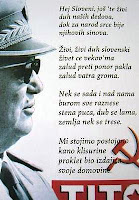The National Anthem of Algeria
 The words to "Qassaman" (We Pledge) were written in 1956 in Serkaji-Barberousse Prison in Algiers, where the author Moufdi Zakaria was incarcerated by the French colonial forces. The poem was put into music, first by Mohamed Triki in 1956, then by the Egyptian composer Mohamed Fawzi. Originally containing five verses, the third verse containing anti-French lyrics was dropped when it became the official national anthem upon independence on July 5th 1962.
The words to "Qassaman" (We Pledge) were written in 1956 in Serkaji-Barberousse Prison in Algiers, where the author Moufdi Zakaria was incarcerated by the French colonial forces. The poem was put into music, first by Mohamed Triki in 1956, then by the Egyptian composer Mohamed Fawzi. Originally containing five verses, the third verse containing anti-French lyrics was dropped when it became the official national anthem upon independence on July 5th 1962.Mohamed Fawzi, (born Mohammed Fawzi Habas Elhaw in 1918 in Tanta Egypt, died 1966) was an Egyptian composer and singer. Fawzi had a beautiful voice which was inherited from his father (a Quran reciter); he began singing at weddings and other events when he was twelve years old. Soon he learned to play the flute, and he went to Cairo looking for an opportunity to sing.
Having studied Arabic music in Cairo, he started to work with Badiah Massabni, and then with Fatma Rush
 di, where he performed and sung the role of Antonio. He started professionally composing music for the theatre and began a professional career working for the Egyptian Radio. Youssef Wahbi cast him in a movie called Sword of the Executioner in 1946. It was the beginning of his long career in the Egyptian movie industry; he performed in and produced more than 36 films.
di, where he performed and sung the role of Antonio. He started professionally composing music for the theatre and began a professional career working for the Egyptian Radio. Youssef Wahbi cast him in a movie called Sword of the Executioner in 1946. It was the beginning of his long career in the Egyptian movie industry; he performed in and produced more than 36 films.Fawzi composed the national anthem of Algeria. He was a pioneer in composing songs of children, many of which are the most popular children songs in the Arab world today. Fawzi was the first to introduce the colour film laboratory to Egypt, and also music records printing factories.
Moufdi Zakaria wrote the Algerian National anthem (Kassaman) whilst in prison in 1955. He was born on June 12, 1908 c.e. He was given the nickname of Moufdi by a school friend. He was born and attended school in the Mzab region of Algeria. His university education was in Tunis where he met a number of poets including Abou el Kacem Chebbi. His first poetry was published in a Tunisian newspaper in 1925.
He became associated with Algerian nationalists and served time in prison for his belief s in 1937 and 1938. In 1956 he was imprisoned in Serkaji-Barberousse Prison by the French for his politics. There he wrote a poem called Qassaman or The Pledge. It was said that he wrote the poem on the walls of his cell using his own blood. The poem was later set to music by Mohamed Triki in 1956 and then by Mohamed Fawzi. The final song was heard in 1957. This poem became the Algerian national anthem shortly after 5 July 1962 when independence was achieved. Zakaria died in 1977 in Tunisia but his body was buried in Algeria.
s in 1937 and 1938. In 1956 he was imprisoned in Serkaji-Barberousse Prison by the French for his politics. There he wrote a poem called Qassaman or The Pledge. It was said that he wrote the poem on the walls of his cell using his own blood. The poem was later set to music by Mohamed Triki in 1956 and then by Mohamed Fawzi. The final song was heard in 1957. This poem became the Algerian national anthem shortly after 5 July 1962 when independence was achieved. Zakaria died in 1977 in Tunisia but his body was buried in Algeria.
He became associated with Algerian nationalists and served time in prison for his belief
 s in 1937 and 1938. In 1956 he was imprisoned in Serkaji-Barberousse Prison by the French for his politics. There he wrote a poem called Qassaman or The Pledge. It was said that he wrote the poem on the walls of his cell using his own blood. The poem was later set to music by Mohamed Triki in 1956 and then by Mohamed Fawzi. The final song was heard in 1957. This poem became the Algerian national anthem shortly after 5 July 1962 when independence was achieved. Zakaria died in 1977 in Tunisia but his body was buried in Algeria.
s in 1937 and 1938. In 1956 he was imprisoned in Serkaji-Barberousse Prison by the French for his politics. There he wrote a poem called Qassaman or The Pledge. It was said that he wrote the poem on the walls of his cell using his own blood. The poem was later set to music by Mohamed Triki in 1956 and then by Mohamed Fawzi. The final song was heard in 1957. This poem became the Algerian national anthem shortly after 5 July 1962 when independence was achieved. Zakaria died in 1977 in Tunisia but his body was buried in Algeria.Above, an envelope with stamp featuring the score of the Algerian anthem and a picture of Zakaria, the anthem lyricist. The stamp in the middle features Mohamed Fawzi, the anthem composer, issued by Egypt in 2000. Below is a stamp of Moufdi Zakaria issued by Algeria in 2008.






